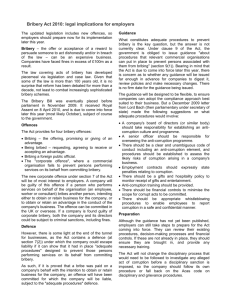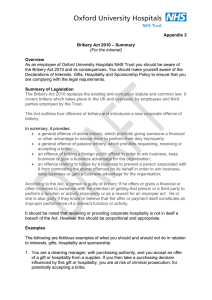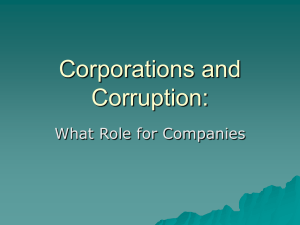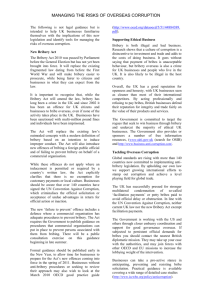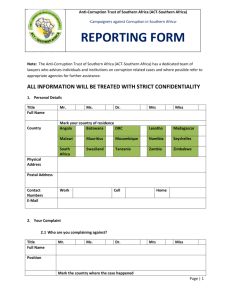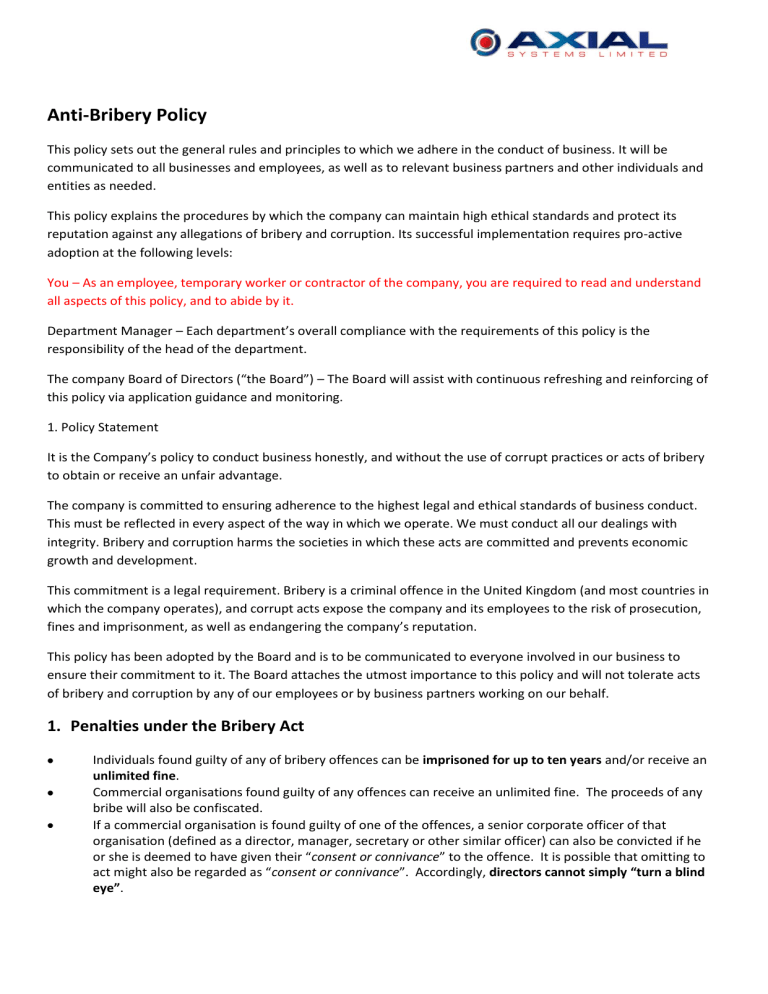
Anti-Bribery Policy This policy sets out the general rules and principles to which we adhere in the conduct of business. It will be communicated to all businesses and employees, as well as to relevant business partners and other individuals and entities as needed. This policy explains the procedures by which the company can maintain high ethical standards and protect its reputation against any allegations of bribery and corruption. Its successful implementation requires pro-active adoption at the following levels: You – As an employee, temporary worker or contractor of the company, you are required to read and understand all aspects of this policy, and to abide by it. Department Manager – Each department’s overall compliance with the requirements of this policy is the responsibility of the head of the department. The company Board of Directors (“the Board”) – The Board will assist with continuous refreshing and reinforcing of this policy via application guidance and monitoring. 1. Policy Statement It is the Company’s policy to conduct business honestly, and without the use of corrupt practices or acts of bribery to obtain or receive an unfair advantage. The company is committed to ensuring adherence to the highest legal and ethical standards of business conduct. This must be reflected in every aspect of the way in which we operate. We must conduct all our dealings with integrity. Bribery and corruption harms the societies in which these acts are committed and prevents economic growth and development. This commitment is a legal requirement. Bribery is a criminal offence in the United Kingdom (and most countries in which the company operates), and corrupt acts expose the company and its employees to the risk of prosecution, fines and imprisonment, as well as endangering the company’s reputation. This policy has been adopted by the Board and is to be communicated to everyone involved in our business to ensure their commitment to it. The Board attaches the utmost importance to this policy and will not tolerate acts of bribery and corruption by any of our employees or by business partners working on our behalf. 1. Penalties under the Bribery Act Individuals found guilty of any of bribery offences can be imprisoned for up to ten years and/or receive an unlimited fine. Commercial organisations found guilty of any offences can receive an unlimited fine. The proceeds of any bribe will also be confiscated. If a commercial organisation is found guilty of one of the offences, a senior corporate officer of that organisation (defined as a director, manager, secretary or other similar officer) can also be convicted if he or she is deemed to have given their “consent or connivance” to the offence. It is possible that omitting to act might also be regarded as “consent or connivance”. Accordingly, directors cannot simply “turn a blind eye”. For a senior officer to be liable, both the body corporate and the senior officer (by having consented to or connived to commit the offence) must be guilty of a bribery offence. Senior officers cannot be liable for an offence committed only by an individual employee. Where the act of bribery took place overseas that director must have a close connection to the UK (i.e. be a British citizen or National or ordinarily resident in the UK). Other Potential Consequences A company director convicted of a bribery offence is also likely to be in breach of his/her duties under Part 10 of the Companies Act 2006 and could be disqualified under the Company Directors Disqualification Act 1986 for a period of up to 15 years. In addition, under the EU Public Sector and Utilities Procurement Directives, implemented in the UK by the Public Contracts Regulations 2006 and the Utilities Contracts Regulations 2006, public authorities are required to exclude from public contracts all suppliers that have been convicted of (among other things) a corruption offence. It is therefore possible that a corporate conviction for bribery could result in permanent exclusion from government contracts across the European Union. Companies borrowing on the Euromarket may be asked to represent in their loan agreements that they are not acting in a manner inconsistent with the Bribery Act. Potentially, therefore, breach of the Bribery Act could result in funding being pulled. Finally, organisations should also be mindful of the accompanying adverse publicity any bribery investigation or conviction is likely to create. 2. What is Bribery and Corruption? Bribery and corruption has a range of definitions in law, but the fundamental principles apply universally. Bribery is the offer, promise, giving, demanding or acceptance of an advantage as an inducement for an action which is illegal, unethical or a breach of trust. Corruption is the misuse of an office or power (whether in government or in business) for private gain. Acts of bribery or corruption are intended to influence recipients in the performance of their duty and incline them to act dishonestly. The person being bribed is generally someone who will be able to obtain, retain, or direct business. This may involve sales initiatives, such as tendering and contracting or it may simply involve the handling of administrative tasks such as licenses, customs, taxes or import/export matters. The timing of the act of bribery e.g. before or after the tendering of a contract or the completion of administrative tasks, is irrelevant. 3. What is a Bribe? Bribes can take on many different shapes and forms, but typically they involve corrupt intent. Both parties will benefit. A bribe could be any of the following: • Direct or indirect promise, offering, or authorisation, of anything of value; • Offer or receipt of any kickback, loan, fee, reward or other advantage; • Giving of aid, donations or voting designed to exert improper influence. 4. Who Can Engage in Bribery or Corruption? In the eyes of the law, bribery and corrupt behaviour can be committed by: • An employee, officer or director of a company; • Any person acting on behalf of the company (e.g. business partners who are agents); • Individuals and organisations where they authorise someone else to carry out these acts. Acts of bribery and corruption will commonly (but not always) involve public or government officials (or their close families and business associates). Government officials could be: • A public official, whether foreign or domestic; • A political candidate or party official; • A representative of a government regulator (e.g. HMRC, industry regulatory body) or of a government-controlled organisation. 5. What Does the Law Say About Bribery and Corruption? Bribery is a criminal offence in the United Kingdom and most of the countries in which the company operates, and penalties can be severe. In the UK the Bribery Act 2010 not only makes bribery and corruption illegal, but also holds UK companies liable for failing to implement adequate procedures to prevent such acts by those working for the company or on its behalf, no matter where in the world the act takes place. Corrupt acts committed abroad, including those by business partners working on our behalf, may well result in a prosecution at home. 6. What Steps Can Be Taken to Prevent Bribery and Corruption? The following steps can be taken to assist in the prevention of bribery and corruption: 6.1. Risk Assessment Risk identification pinpoints the specific areas in which the company may face bribery and corruption risks and allows the board to better evaluate and mitigate these risks thereby protecting the company and its employees. Risk assessment is intended to be an ongoing process with continuous communication between the board, tiers of management, all employees, and where relevant, by business partners working on the company's behalf. 6.2. Accurate Books and Record-Keeping Inaccurate record-keeping can lead to serious bribery and corruption offences. The company must ensure that it maintains accurate books, records and financial reporting within all of the company's business units and for significant business partners working on our behalf. The company's books, records and overall financial reporting must also be transparent. 6.3. Effective Monitoring and Internal Control The company must maintain an effective system of internal control and monitoring of its transactions. Once bribery and corruption risks have been identified and highlighted via the risk assessment process, procedures can be developed within a comprehensive control and monitoring programme in order to help mitigate these risks on an ongoing basis. 7. Where Do the Bribery and Corruption Risks Typically Arise? Bribery and corruption risks typically fall within the following categories: 7.1 Use of Business Partners The definition of a business partner is broad, and could include agents, distributors, joint venture partners or partners in the company’s supply chain who act on behalf of the company. Whilst the use of business partners can help us reach our business goals, we need to be aware that these arrangements can potentially present the company with significant risks. Risk can be identified where a business partner conducts activities on the company’s behalf, so that the result of their actions can be seen as benefiting the company. Such business partners are more commonly known as agents. Business partners who act on the company’s behalf must always be advised of the existence of, and operate at all times in accordance with, the company's Anti-corruption policy. Management are responsible for the evaluation of each relationship and determining whether or not it falls into this category. Where risks regarding a business partner arrangement has been identified, management must: • Evaluate the background, experience, and reputation of the business partner; • Understand the services to be provided, and methods of compensation and payment; • Evaluate the business rationale for engaging the business partner; • Take reasonable steps to monitor the transactions of business partners appropriately; • Ensure there is a written record in place which acknowledges the business partner’s understanding and compliance with this policy. The company is ultimately responsible for ensuring that business partners who act on its behalf are compliant with this policy as well as with any local laws. Ignorance is not an excuse. 7.2. Gifts, Entertainment and Hospitality Gifts, entertainment and hospitality include the receipt or offer of gifts, meals or tokens of appreciation and gratitude, or invitations to events, functions, or other social gatherings, in connection with matters related to our business. How to evaluate what is ‘acceptable’: First, take a step back and consider the following: • What is the intent – is it to build a relationship or is it something else? • How would this look if these details were on the front of a newspaper? • What if the situation were to be reversed – would there be a double standard? If you find it difficult to answer one of the above questions, there may a risk involved which could potentially damage the company’s reputation and business. The action could well be unlawful. The following guidance should be considered globally: Usually acceptable Possible circumstances that are usually acceptable include: • Modest/occasional meals with someone with whom we do business; • Occasional attendance at ordinary sports, theatre and other cultural events; • Gifts of nominal value, such as pens, or small promotional items. Never acceptable may include Circumstances which are never permissible include examples that involve: • A ‘quid pro quo’ (offered for something in return) • Gifts in the form of cash/or cash equivalent vouchers • Entertainment of a sexual or similarly inappropriate nature • Lavish corporate hospitality As a general rule, the company employees and business partners should not provide gifts to, or receive them from, those meeting the definition of a government official in section 4 (or their close families and business associates). Transparency is key. The simplest way to assess the risk of hospitality being considered to be a potential bribe, based on the principles of the Act will be to ask, in relation to each item of hospitality, “would my competitors think this hospitality is excessive/suspicious?” If so, best practice would be to refrain, or reduce the scope of the hospitality to a more proportionate level. In more practical terms, the following list provides some guidance on what is likely to be high/low risk of being viewed as a potential bribe (bearing in mind that the improper performance test also needs to be satisfied for one of the offences to have been committed): Low risk Taking business contacts out for lunch and dinner, accompanied by you Provision of flights, taxis or other transport services to facilitate a meeting or on site visit Tickets to sports or other cultural events, accompanied by you Taking business contacts on a golf day with members of your organisation Gifts such as corporate pens, calendars etc High risk Paying for lunch and dinner for business contacts, unaccompanied by you Provision of flights, taxis or other transport services to facilitate non-business related activities, such as paying for 5 star holidays Tickets to sports or other cultural events, unaccompanied by you Flying business contacts unaccompanied overseas for a golf holiday Lavish gifts such as expensive watches, or even cars Also consider timing. Providing hospitality to a key decision maker just before the decision is made may be treated as a higher risk as it may be seen as having the purpose or intention to influence the decision. Management will be required to maintain and monitor its gifts, entertainment and hospitality. In the event that an inappropriate or impermissible form of gift, entertainment or hospitality has been granted or accepted, you must contact the Managing Director. 7.3 Facilitation Payments Facilitation payments are illegal within the United Kingdom The UK Bribery Act 2010 makes no distinction between facilitation payments and bribes regardless of size or local cultural expectations, even if that is “how business is done here”. If a facilitation payment is requested, or if you are forced to pay under duress or faced with potential safety issues or harm, such a payment may be made, provided that certain steps are followed. If you are ever placed in such a situation, you must contact the Compliance Officer or Legal Department as soon as possible and you must record the payment appropriately within the company’s books and records to reflect the substance of the underlying transaction. If you are unsure whether certain payments which resemble the definition of facilitation payments are permissible, please contact the Managing Director. 8. Departmental Adoption In order for this policy to be effective, it must be applied across all departments. Department Managers are responsible for taking relevant steps within their department to ensure and continuously monitor compliance with this policy. 9. How to Raise a Concern We all have a responsibility to help detect, prevent and report instances not only of bribery, but also of any other suspicious activity or wrongdoing. The company is committed to ensuring that everybody has a safe, reliable, and confidential way of reporting any suspicious activity. the board wants each and every one to know how they can “speak up”. If you have a concern regarding a suspected instance of bribery or corruption, please speak up – your information and assistance can only help. The sooner you act, the better for you and for the company. If you are concerned that a corrupt act of some kind is being considered or carried out – either within the company, by any of our business partners or by any of our competitors – you must report the issue/concern to your Line Manager. If for some reason it is not possible to speak to your Line Manager, please then report it to another Senior Manager, or the Managing Director . In the event that an incident of bribery, corruption, or wrongdoing is reported, the company will act as soon as possible to evaluate the situation. The company has clearly defined procedures for investigating fraud, misconduct and non-compliance issues and these will be followed in any investigation of this kind. 10. Conclusion and Certification It is the ultimate responsibility of the Board to refresh and reinforce this policy and its underlying principles and guidelines. The board is responsible for the establishment and ongoing monitoring of compliance with sections 6, 7 and 8 of this policy.
